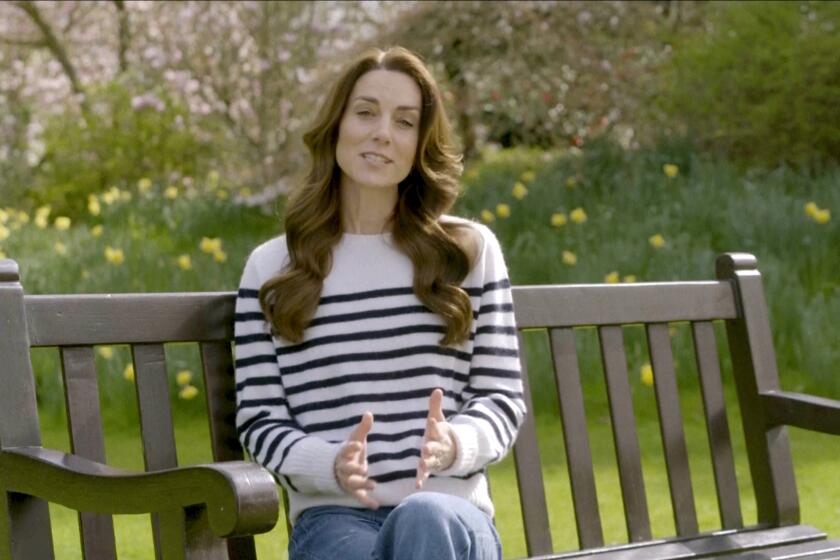Opinion: The Princess of Wales’ public honesty is appreciated but it wasn’t necessary

The news that Catherine, Princess of Wales had undergone surgery and would return to her duties by Easter set off a firestorm of speculation about the princess’ well-being and her marriage. The worst of it came when news broke that staff at the London Clinic, where she was treated, were suspected of accessing Catherine’s medical records.
The frenzy culminated Friday when the princess finally addressed the escalating furor. In a video, Kate, pale and thin, sat alone on a bench to explain her absence and revealed a cancer diagnosis (discovered post-surgery), for which she had begun preventative chemotherapy.
Composed and graceful, her disclosure magnified the sobering nature of the true story, and illustrated how the world’s insatiable need to know everything about the royals had seemingly forced Kate’s hand and prompted the statement. But it’s an announcement that, royal or not, she didn’t owe anyone.
Kate Middleton’s video in which she shares her cancer diagnosis stuns the tabloids into silence — for the moment anyway — with its revolutionary frankness.
Instantly and then throughout the weekend, the ubiquitous reaction was frustration that the truth, rather than royal hedging, would’ve been a more appropriate way to handle the situation.
There was once a time when I too would’ve said brutal honesty is the best policy. Kate’s news has sent memories of my own experience with family cancer flooding back.
In May 2010, I got word that my single mom, a 64-year-old who had been in cancer remission for four years, had been rushed to the ER. When I arrived at the hospital, I was informed by the doctor that her cancer had returned — apparently four months earlier. I barely had time to discuss it with her, or to process it for myself. Three days later she was gone. At 29 years old, left with intense grief and confusion, I felt that keeping that big of a secret from me was the ultimate betrayal.
Now, I have a new perspective, one that allows me to practice greater compassion for what my mom went through and to understand why even the most public of public people, a woman destined to be a British queen, would keep her diagnosis private.
The video announcement by Catherine, Princess of Wales, about her cancer diagnosis was short on specifics. Here’s a look at what we know.
I can’t pretend I don’t wish my mom had confided in me, if for no other reason than to give us more time together.
But almost 14 years later, I’ve realized that the depths of what she must’ve endured surpass my feelings of being left behind. The diagnosis surely frightened her, and she needed to internalize her new reality before she could expose me to it. Shielding me from it was unselfish — a final, pure act of love for her daughter.
Learning you have cancer (or that it has returned) must be, as Kate expressed, “a huge shock.” It’s a freight train that hits not only its recipient but everyone around them. It’s followed by a barrage of difficult decisions about radiation, chemotherapy, doctors and for my mother if not a princess. finances and a will (which my mom didn’t have, or, I never found). Let alone being faced with one’s own mortality.
Many will shame royal watchers for speculating about the Princess of Wales’ health. But catastrophic missteps by the royal communications apparatus created this mess.
Sharing those thoughts and choices with children is nuanced and complicated. My mother wasn’t equipped to address it with the closest person in her life. I can’t imagine the magnitude of what Kate felt being pressured to openly share her cancer diagnosis to a worldwide audience rabid for answers about her disappearance from the public eye.
I applaud her for choosing honesty with their children. She explained in the video that “it has taken us time to explain everything to George, Charlotte and Louis in a way that is appropriate for them, and to reassure them that I am going to be OK. As I have said to them, I am well and getting stronger every day by focusing on things that will help me heal.”
I now understand that people keep cancer a secret as a form of self-preservation and to protect others.
Our culture often leans towards anger or bewilderment when discovering a well-known person kept an illness hidden. After Chadwick Boseman died of colon cancer in 2020, it seemed unfathomable that he never disclosed it. The public wanted answers.
Many also feel that the princess owed us something, not only to avoid the months of constant speculation but to allow the public to provide sympathy. This view may seem superficially warm-hearted. But it puts one’s own altruism, and a vain desire to participate in a public person’s life, above the mental health of someone newly diagnosed with a scary illness.
Time is needed, private time. We were not entitled to take that from Kate.
Her solo statement was brave. Nonetheless, she shouldn’t have been pushed to deliver it. My mom is long gone, but I now know that anyone — even a royal princess — is deserving of space, as much of it as she wants.
Blake Turck’s writing has appeared in Huffpost, Travel + Leisure and the Washington Post.
More to Read
A cure for the common opinion
Get thought-provoking perspectives with our weekly newsletter.
You may occasionally receive promotional content from the Los Angeles Times.












